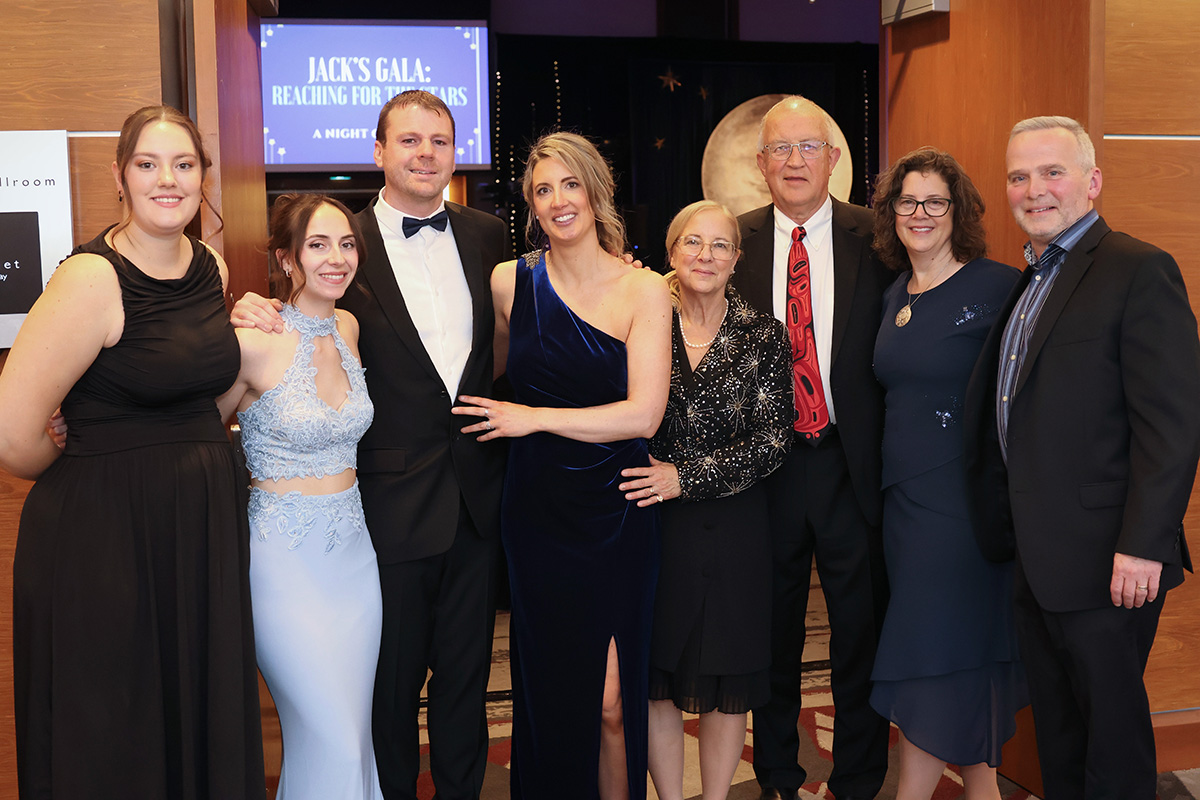
In support of advancing gene therapy and offering hope.

Finding a Cure for SPG4
“There is no cure, nor is there any treatment to stop the progression. It meant that his legs were slowly becoming paralyzed, and that there was nothing we could do to help him. As parents who feel helpless with a child who has a progressive disease with no cure, we decided that what we could do was support those that could help our son. We are now fundraising to support research for the SPG4 cure and to save our son from this disease.
“Thank you for supporting our family and giving us hope!”
~ Anna and Richard a.k.a Jack’s parents
At one time, the idea of sending an astronaut into outer space was just a dream, one brought to life by pushing the boundaries of science and technology.
That’s why it felt so fitting that space travel served as the inspiring theme for an inaugural charity gala aimed at finding a cure for a Stittsville boy in need. Just as space exploration holds limitless potential, so too does medical science for children like eight-year-old Jack Laidlaw.
The aspiring astronaut, with dreams of being the first to step foot on Mars, was diagnosed in late 2023 with a rare, progressive genetic condition called SPG4 (spastic paraplegia type 4). It will eventually cause Jack to lose his ability to walk. While there is currently no cure or treatment, researchers south of the border are working to change that. That’s where the hope comes in, along with the need for his family to fundraise.
On Saturday, more than 280 people gathered at the Brookstreet Hotel for Jack’s Gala: Reaching for the Stars, supported by friends, neighbours and businesses, including major sponsor Power-Tek Group.
Seven-year-old Jack Laidlaw, the oldest of three boys, is upbeat and friendly to everyone he meets, according to his parents, Anna and Richard Laidlaw. But Jack faces challenges due to a rare disorder he cannot yet comprehend. His parents are determined to remain hopeful and create a better future for him despite his diagnosis of hereditary spastic paraplegia type 4 (SPG4).
“We will do anything to get this cure for Jack.”
– Anna Laidlaw
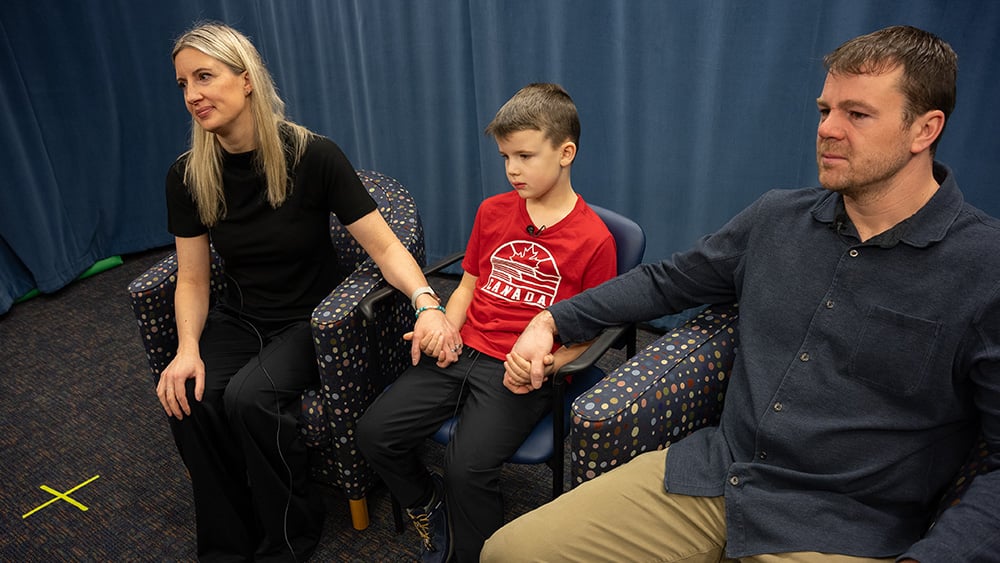
What is SPG4?
SPG4 is a rare, inherited, neurodegenerative disease that causes progressive muscle stiffness and weakness in the legs. More than half of individuals with SPG4 have weakness in the legs and a decreased ability to sense vibration at the ankles.
Jack’s story

We are Richard and Anna from Ottawa, Canada. We gave birth to a beautiful baby boy in 2017 named Jack. There are no words to describe the love and joy you feel when you hold your child for the first time and become parents for the first time. It was one of the happiest and most memorable days of our lives. Our little boy has grown up and is now 6 years old. He is kind, funny, happy, smart, empathetic, considerate, caring, sweet, loving, respectful and hard-working. He now has two little brothers and takes his role of big brother seriously – he cares for them, protects them, watches out for them and makes them (and us all) laugh. Jack has a heart of gold and a bright light that shines within him. It is an absolute pleasure to be his parents. We are so very proud of him.
Around the age of 2, we noticed that Jack’s toes pointed inward when walking (also known as in-toeing) and that the muscles in his legs were stiff. We took him to our family doctor, who mentioned that this can be normal in the early years of a child, and that they usually grow out of it. By the age of 3, with no signs of improvement, we took him back to our family doctor who referred him to pediatric physiotherapy. After a year of physiotherapy, his physiotherapist was concerned that there was no improvement in his feet, legs or gait (how he walked). She noted there may be underlying neurological symptoms and suggested that he should be assessed by a neurologist. Our family doctor then referred us to the Children’s Hospital of Eastern Ontario to doctors in both neurology and orthopedics. After being assessed, the doctor in orthopedics recommended orthotics, and the doctor in neurology started running tests to try and identify the underlying cause of his symptoms.
Learn more…
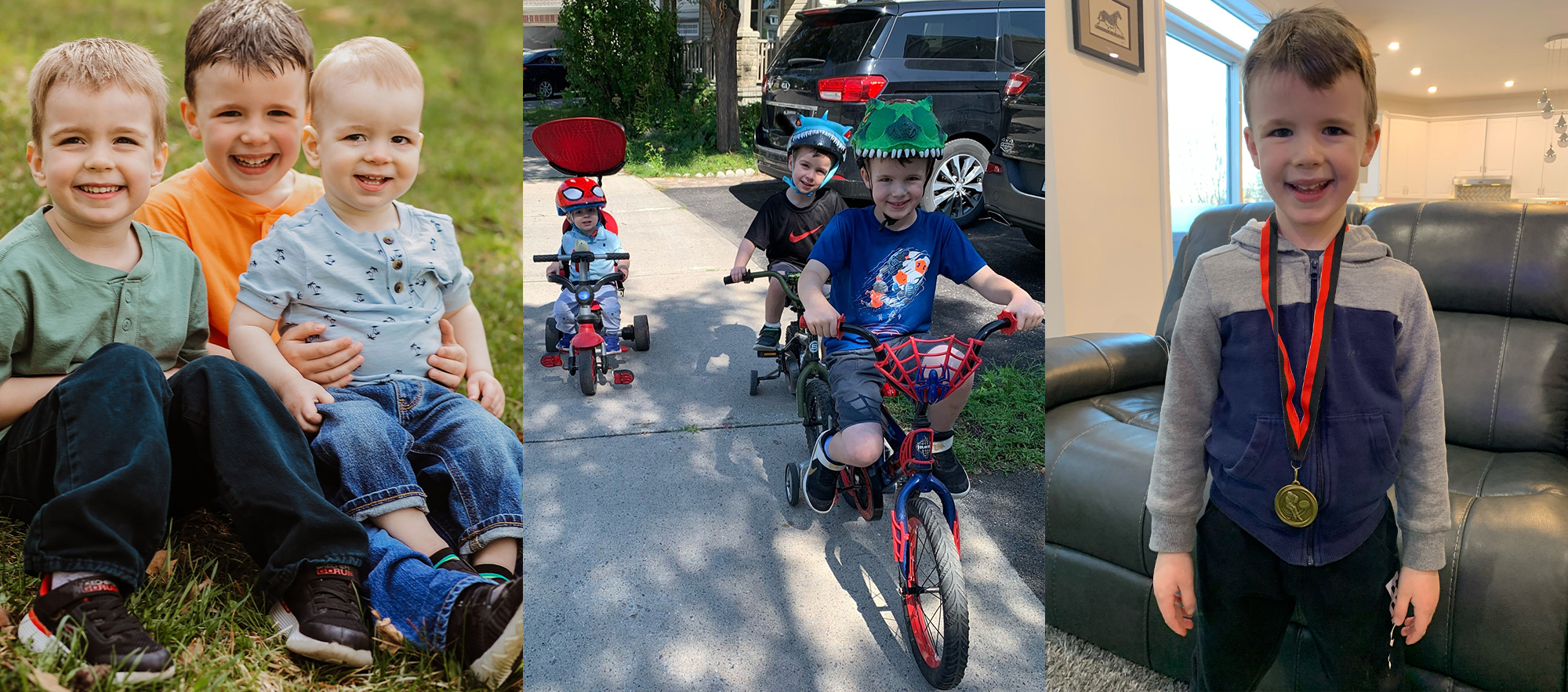
What is Hereditary Spastic Paraplegia Type 4 (SPG4)?
SPG4 is a rare genetic disease and neurological disorder. It is caused by a mutation in the SPAST gene, which is a gene that helps motor neurons function correctly in the brain and spinal cord. The main symptom of this disease is muscle weakness and spasticity (stiffness) in the legs. These symptoms arise due to the degeneration of the upper motor neurons in the brain and spinal cord. Upper motor neurons relay messages to the lower motor neurons in the brain stem and spinal cord, and the lower motor neurons carry these messages to the muscles. As the upper motor neurons degenerate, the correct messages are not carried to the lower motor neurons, and thus, the correct messages are not transmitted to the muscles. SPG4 is a progressive disease. Once symptoms begin, degeneration continues, and muscle weakness and spasticity worsen over time. People with SPG4 may then eventually lose the ability to walk on their own and this can be coupled with additional symptoms such as incontinence.
Why are we Fundraising?
There is no cure for SPG4, nor are there any treatments to stop the progression of the disease. An experienced and collaborative group of researchers have come together to develop a cure for SPG4. They need help with continued funding through all phases of research, so that the cure can reach human clinical trials. We are fundraising to support this research. There will be different phases of research as the SPG4 cure progresses to human trials, and different costs associated with these phases. Once it reaches human trials, our aim is for our son to receive gene therapy and be cured from this disease.
We are fundraising with a sense of urgency due to the progressive nature of this disease. Once our son’s neurons degrade, they cannot be restored or grow back. We are hoping that the cure for SPG4 can be developed before our child’s disease progresses to paralysis. While this diagnosis is rare, it is not unique. SPG4 affects around 1 in every 50,000 people. The development of a cure for SPG4 could help everyone affected by this progressive disease!
SPG4 Cure Research
We are currently raising funds to support research for the SPG4 cure led by an experienced, world-class research team at UMass who are also partnering on this project with other experienced and world-class researchers at Drexel University and the Boston Children’s Hospital. The cure they are developing is a gene therapy which aims to replace the disease-causing mutation in the SPAST gene with a healthy copy of the SPAST gene by way of an AAV mediated silence and replace strategy. Their goal is to have an AAV vector that can be used in any SPG4 patient, regardless of their specific mutation or variant. Jack’s incredible doctors at the Children’s Hospital of Eastern Ontario are very interested in this research.
If you would like to learn more about gene therapy, please see the UMass Translational Institute for Molecular Therapeutics website . Their website details previous gene therapy research that they have successfully brought to human clinical trials. They are currently adding more information to this website, including their current project on SPG4 gene therapy research.
Fundraising Timeline
We are starting to fundraise immediately. We will continue to fundraise through all the stages of research required for the SPG4 cure to reach human clinical trials, and until our son receives the cure.
How to donate:
We thank you from the bottom of our hearts for your generous consideration of making a donation. We are so grateful for any and all donations made!
Donations can be made by clicking the donation button below:
Donations are processed by Blu Genes Foundation. The Blu Genes Foundation supports research for rare genetic disorders and has kindly offered to help us tell our story by providing us a forum, our own webpage, on their website. One hundred percent of your donation through the link on our webpage will go directly to funding research for the SPG4 cure and helping us to save our son from this disease. Thank you so much for your generosity in considering our need for help.
Please note that donations from both Canada and the United States, as well as internationally, can be accepted through this link. Upon donation, you will receive a Canadian Charitable tax receipt via email for any donations of $20 or more (For those in Canada: UMass is included on the list of universities outside of Canada registered as qualified donees by the Canada Revenue Agency).
Research becoming reality – A Visit to UMass and Boston Children’s Hospital
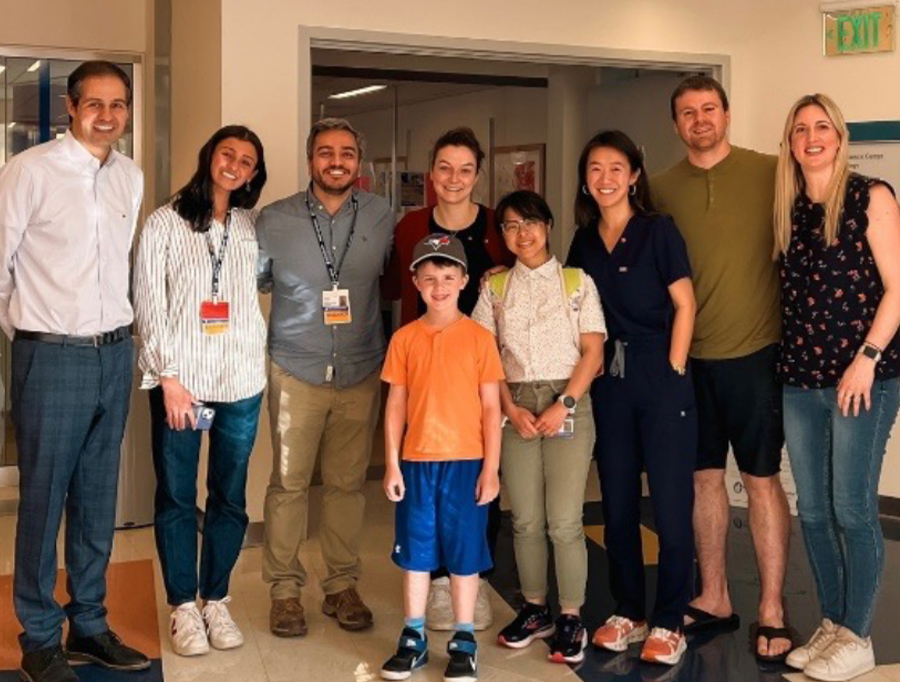
Jack and his family recently visited the team at Boston Children’s hospital for Jack’s assessment with HSP expert Dr. Ebrahimi-Fahkari, as a part of the Registry and Natural History Study for Early Onset Hereditary Spastic Paraplegia. This research study, which Jack is registered in, aims to advance knowledge of the causes, clinical course, diagnosis and treatment of HSP.
Jack also joined another study, Hereditary Spastic Paraplegia Genomic Sequencing Initiative (HSPseq), which aims to better understand the role of genetics in hereditary spastic paraplegia (HSP) and related disorders, which may help to develop better treatments for sub-categories of HSP- for example, the researchers at UMass may use these sequences to help develop the gene therapy cure for SPG4. Anna and Richard, Jack’s parents, also gave our blood samples for sequencing as a part of this study.
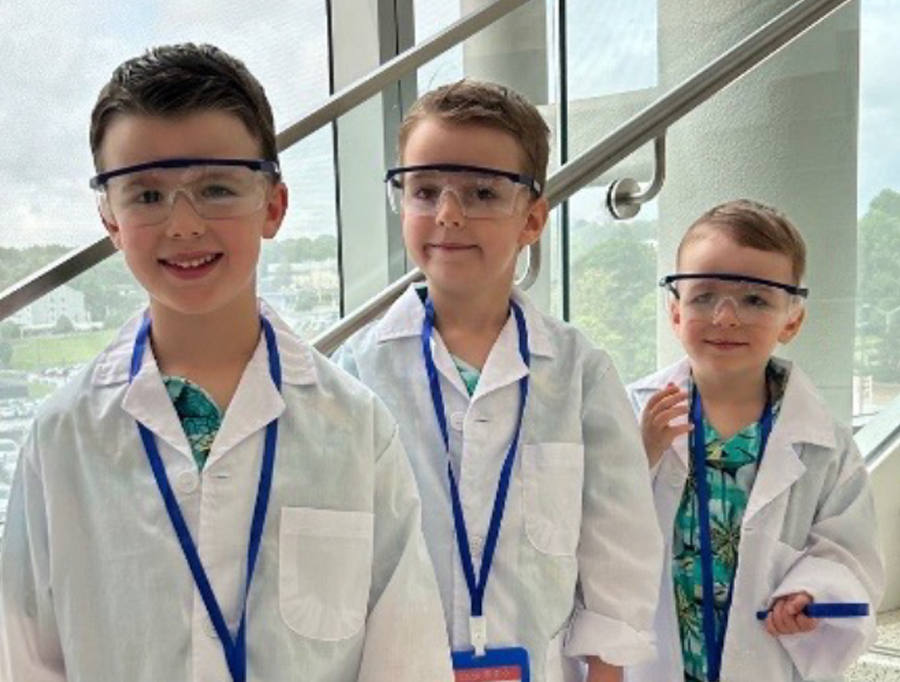
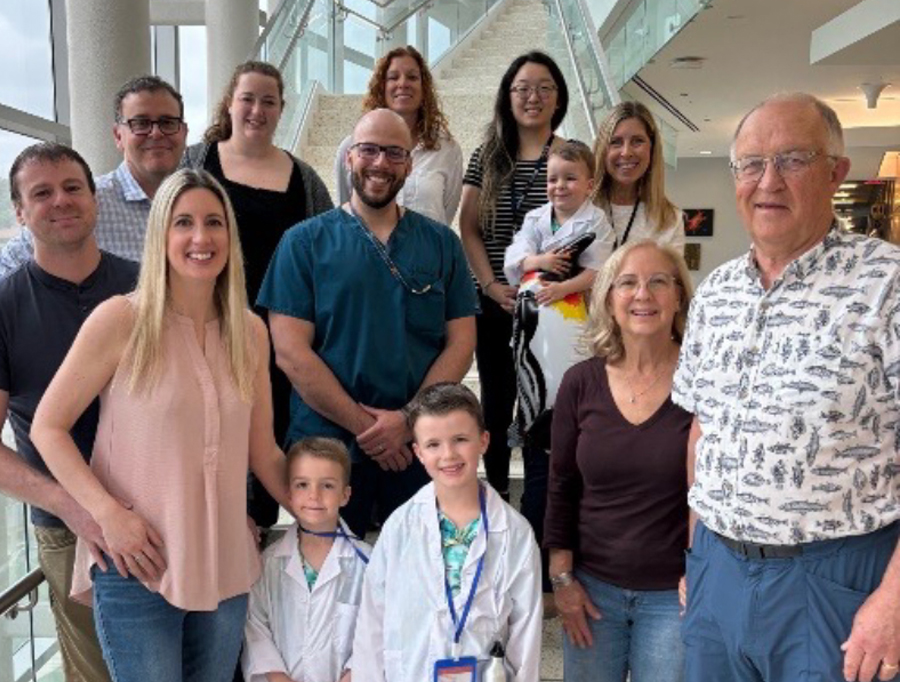
Jack and his family also visited UMass Chan Medical School, who are developing the gene therapy cure for Jack’s disease, SPG4. They welcomed the family with open arms. They took the time to explain the gene therapy they are developing and had little lab coats for Jack and his brothers. The gene therapy for SPG4 may be 2 years away if it can be funded! Costs of funding for this research for this year alone is 1 million USD and 3 million USD over the next 2 years.
Thank you for supporting our family and giving us hope!!!
Resources
If you would like to learn more about SPG4, please see these resources:
- Cure SPG4 Foundation
- The Lilly and Blair Foundation
- Spastic Paraplegia Foundation, Inc.
- Hereditary Spastic Paraplegia (Boston Children’s Hospital)
- Registry and Natural History Study for Early Onset Hereditary Spastic Paraplegia (HSP; study from the Boston Children’s Hospital that Jack is enrolled in)
- Spastic Paraplegia 4
- Hereditary spastic paraplegia SPG4: what is known and not known about the disease
- Maurya Koduri Foundation
In the News
- Saskatchewan artist fundraising to help family whose son has genetic disease
- Ottawa community helping fundraise for boy with rare disease
- Family with child affected by SPG4 visits UMass Chan researchers developing gene therapy
- Taylor Swift tickets auctioned off to research rare disease gifted to Ottawa boy | CTV News
-
- Taylor Swift’s Eras Tour inspires unexpected windfall of generosity – The Globe and Mail
Contact
If you have any questions, please feel free to contact us at SPG4CureFundraiser@outlook.com



